Savills Bundle
Can Savills Continue Its Ascent in the Global Real Estate Market?
Savills, a titan in the global real estate market, has consistently demonstrated a robust Savills SWOT Analysis. Its journey from a 19th-century London-based firm to a global powerhouse offering diverse services reflects a commitment to strategic foresight and adaptability. This analysis delves into the Savills growth strategy and examines its Savills future prospects within the dynamic real estate market.
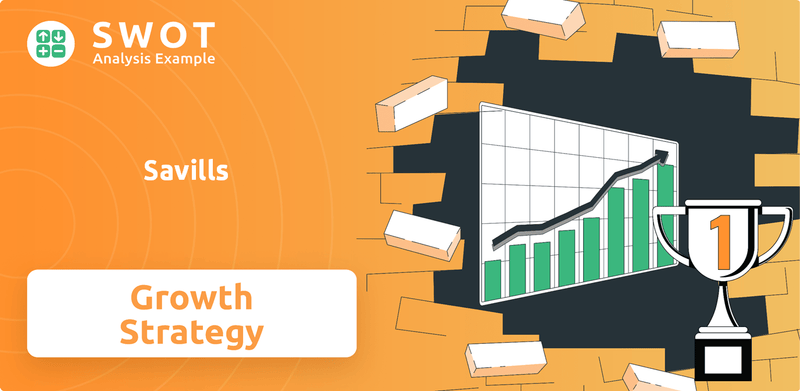
The company's extensive reach, encompassing commercial property, residential, and rural sectors, showcases its comprehensive approach. With a focus on innovation and strategic expansion, including significant investment management transactions in 2024, Savills is well-positioned to navigate the evolving landscape. This Savills company analysis will explore its Savills performance, expansion plans, and the key drivers shaping its long-term growth outlook in the face of emerging challenges and opportunities.
How Is Savills Expanding Its Reach?
The expansion initiatives of Savills are multifaceted, focusing on geographical growth, diversification of its service offerings, and strategic partnerships to enhance its market position. The company's approach involves entering new markets and broadening its portfolio to capitalize on emerging opportunities within the real estate sector. This strategy is supported by acquisitions and investments, aiming to strengthen its presence and capabilities in key areas.
Savills is actively pursuing expansion by entering new markets, diversifying its portfolio, and leveraging strategic partnerships. In 2024, Savills Investment Management completed €366 million in transactions, strategically adding 90,000 sqm of living, logistics, and food retail assets across the Iberian Peninsula. This rebalancing reflects a focus on sectors with robust fundamentals and compelling long-term growth prospects, with a particular emphasis on the living sector in 2025.
Geographical expansion is a key element of Savills' strategy, with significant developments in various regions. Savills Egypt reported EGP 2.76 billion in tenant sales across its managed portfolio in 2024, serving nearly 17 million consumers. For 2025, Savills Egypt plans to launch new service lines within property management, expand its portfolio, especially towards East Cairo, and introduce corporate and demise services. In India, Savills projects data center stock to grow at a CAGR of 21% between 2024 and 2030, reaching 3,400 MW IT, with an estimated demand of over 450 MW IT in 2025 across major cities. This highlights a strategic focus on high-growth sectors and regions.
Savills is expanding its geographical footprint and diversifying its service offerings to capture new market segments. This includes strategic investments in high-growth sectors and regions, such as data centers in India and the expansion of its property management services in Egypt. The company's focus on sectors with strong long-term growth prospects, like the living sector, is a key part of its strategy.
Savills is actively pursuing strategic partnerships and acquisitions to strengthen its market position and broaden its capabilities. The acquisition of Osborne King in April 2025 and Situu in April 2024 exemplifies the company's commitment to accessing new customer segments and diversifying revenue streams. These moves are designed to maintain a leading position in the evolving real estate industry.
Savills Investment Management's Simply Affordable Homes fund, launched in April 2024, is actively involved in the affordable housing sector. The fund's second affordable homes purchase in May 2025, acquiring over 100 operational homes in Oxfordshire, demonstrates its commitment to this sector. The fund now manages a total of 367 affordable homes across the South of England, East of England, and the Midlands.
The company's expansion initiatives, including strategic acquisitions and investments, are driven by a desire to access new customer segments, diversify revenue streams, and maintain a leading position in the evolving real estate industry. These efforts are supported by a detailed Brief History of Savills, which provides context to the company's ongoing development.
Savills' expansion strategy includes significant investments and acquisitions aimed at strengthening its market position and diversifying its portfolio. The company is focusing on key sectors like living and data centers, while also expanding its presence in high-growth regions such as India and Egypt. These initiatives are supported by strategic partnerships and acquisitions to drive long-term growth.
- Completed €366 million in transactions in 2024.
- Projected data center stock growth of 21% CAGR in India between 2024 and 2030.
- Savills Egypt reported EGP 2.76 billion in tenant sales in 2024.
- Acquired Osborne King in April 2025 and Situu in April 2024.
Savills SWOT Analysis
- Complete SWOT Breakdown
- Fully Customizable
- Editable in Excel & Word
- Professional Formatting
- Investor-Ready Format
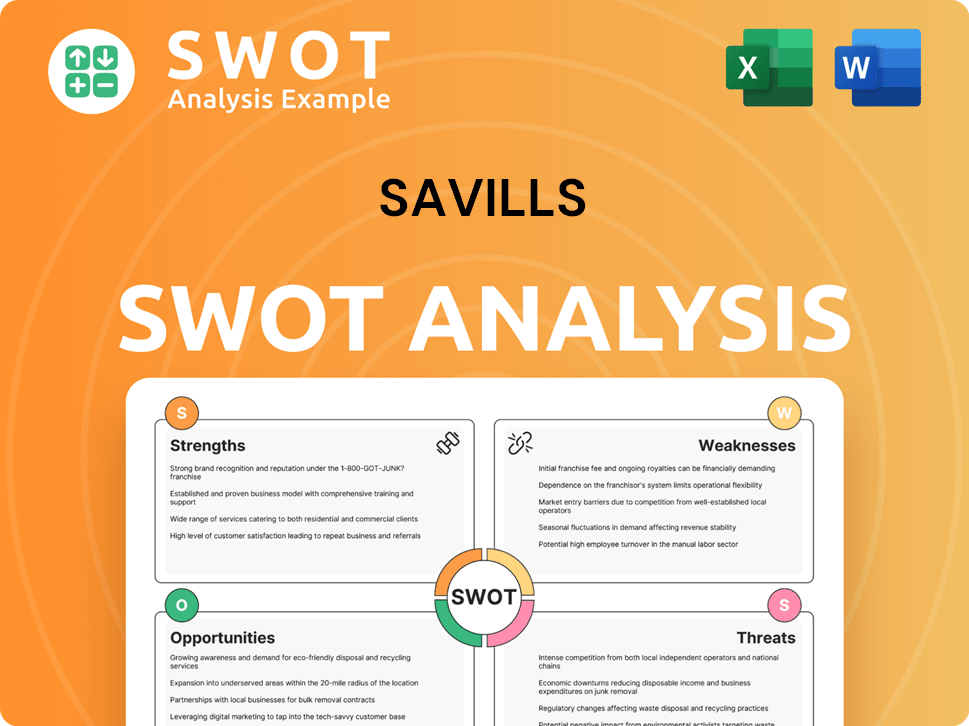
How Does Savills Invest in Innovation?
The company's approach to growth is significantly shaped by its commitment to innovation and technology. This strategy is central to enhancing service offerings, improving operational efficiencies, and achieving sustainable growth within the competitive real estate market. The integration of cutting-edge technologies is a key component of its long-term vision.
A key focus is on digital transformation and automation to streamline processes. This includes leveraging artificial intelligence (AI) and data analytics to gain deeper insights into market trends and client needs. The company's investment in technology is designed to not only improve its internal operations but also to provide better experiences for its clients and stakeholders.
The company's focus on technology and innovation is evident in its sustainability efforts. For example, in 2024, the company's Investment Management division utilized AI in building management to reduce energy consumption. This initiative is part of a broader strategy to meet climate action goals.
The company uses AI to reduce energy consumption in building management. This is a key part of its climate action initiatives. The use of AI helps to optimize energy usage and reduce environmental impact.
In Singapore, the Energy and Sustainability Management (ESM) team implemented a data-driven approach. This included a SMART Green Dashboard and an upgraded Building Management System (BMS). This resulted in a 20% energy reduction.
In Egypt, the company introduced a Building Management System (BMS) in chilled water stations. This led to savings of 9.5% in electricity, 21.3% in gas, and 12% in water compared to 2023.
AI algorithms are used for property valuation and predictive analytics. This helps forecast market trends and property prices. This supports investors and developers in making informed decisions.
AI is also used to transform document management in real estate transactions. It extracts and analyzes information, reducing paperwork and improving accuracy. This streamlines the transaction process.
Since 2018, the company has used the SINGU platform. This is a CAFM application for efficient management of office buildings. It helps in managing and maintaining office spaces effectively.
The integration of technology has a direct impact on the company's growth objectives. These advancements enhance operational efficiency, provide deeper market insights, and support sustainability goals. This demonstrates the company's leadership in innovation within the real estate market.
- Enhanced Operational Efficiency: Streamlined processes through automation and AI.
- Deeper Market Insights: Predictive analytics for better investment decisions.
- Sustainability Goals: Reduced energy consumption and environmental impact.
- Client Experience: Improved services and more informed decision-making.
- Competitive Advantage: Positioning the company as an innovator in the real estate sector.
The company's commitment to innovation and technology is a key driver of its long-term growth and success. By leveraging these advancements, the company aims to maintain its competitive edge and adapt to the evolving demands of the Competitors Landscape of Savills and the broader real estate market. This focus on technology supports the company's expansion plans and its overall financial performance.
Savills PESTLE Analysis
- Covers All 6 PESTLE Categories
- No Research Needed – Save Hours of Work
- Built by Experts, Trusted by Consultants
- Instant Download, Ready to Use
- 100% Editable, Fully Customizable
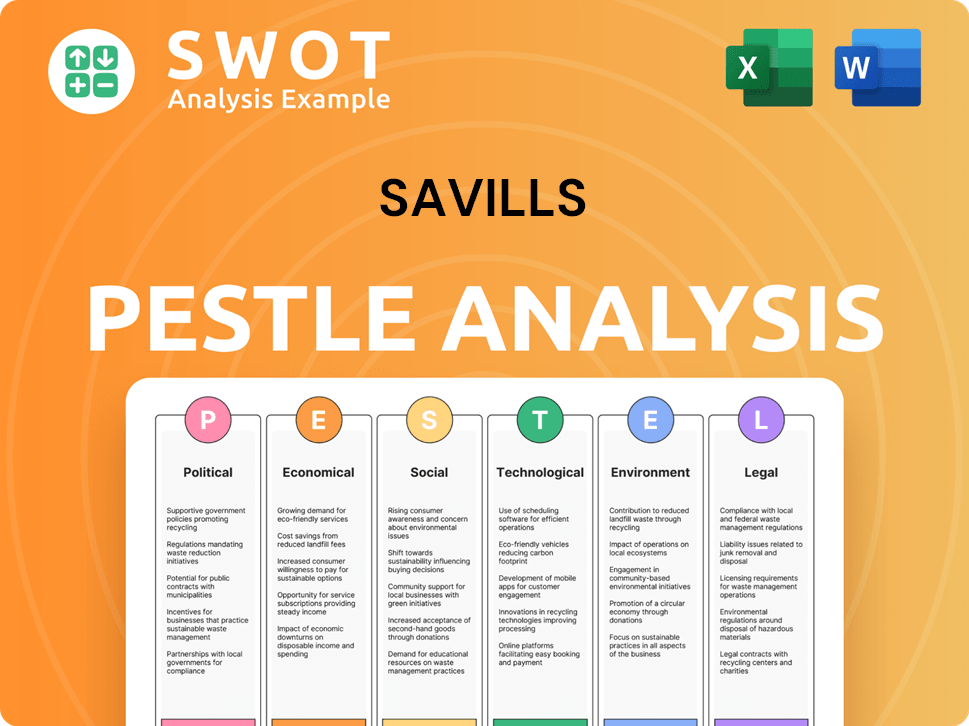
What Is Savills’s Growth Forecast?
The financial outlook for Savills is positive, supported by a recovery in various property markets and strategic investments. The company's Annual Report and Accounts for the year ending December 31, 2024, and the Notice of the 2025 Annual General Meeting (AGM) were released in April 2025. This indicates a proactive approach to financial transparency and future planning, crucial for stakeholders. This proactive approach is a key component of the Owners & Shareholders of Savills.
Savills Investment Management completed €366 million in transactions in 2024, focusing on high-quality, sustainable assets. These assets are in sectors like living, logistics, and food retail, which offer strong fundamentals and long-term growth prospects. The company’s strategy emphasizes diversification and investment in resilient sectors, positioning it well for future growth. This approach demonstrates a commitment to sustainable development initiatives.
The UK property market is expected to show renewed confidence in 2025. Annualized returns are projected to rise to 7.4% from 6.8% in 2024, driven by an anticipated resurgence in capital value growth. The focus on these markets indicates a strategic approach to capitalizing on emerging trends and opportunities.
Mainstream house prices in the UK are forecasted to return to growth by 2025. A 4% growth is penciled in for 2025 alone, with overall house price growth of 20% to 25% over the next five years. Rental growth in the UK is also projected at 18.1% by 2028, showcasing strong potential for revenue growth.
The UK commercial sector is set for increased stability in 2025, following a 20% rise in investment volumes for office and industrial sectors in 2024. Renewed institutional interest in UK retail sectors is expected, along with significant growth in the office sector due to limited new supply and improving business demand.
The office investment market in Seoul is anticipated to expand slightly in 2025, driven by the maturity of real estate funds and the growth of corporate-sponsored REITs. Transaction volumes are projected around KRW 13 trillion, surpassing the KRW 11.6 trillion recorded in 2024. This growth indicates a strong expansion plan.
Savills Egypt reported EGP 2.76 billion in tenant sales in 2024 across its managed portfolio, reflecting strong operational performance. The company achieved substantial growth with a 68% revenue increase and a 76% rise in profits year-on-year during the award review period from May 2023 to June 2024. This demonstrates robust financial performance review.
Savills' financial ambitions are supported by a focus on income potential and strategic buying in markets where capital values may have over-corrected. This approach to the real estate market highlights the company's proactive investment strategy and its ability to navigate market fluctuations. The emphasis on sustainable assets and strategic buying positions the company for long-term growth.
- Focus on income potential
- Strategic buying in markets with over-corrected capital values
- Emphasis on sustainable assets
- Diversification of portfolio
Savills Business Model Canvas
- Complete 9-Block Business Model Canvas
- Effortlessly Communicate Your Business Strategy
- Investor-Ready BMC Format
- 100% Editable and Customizable
- Clear and Structured Layout
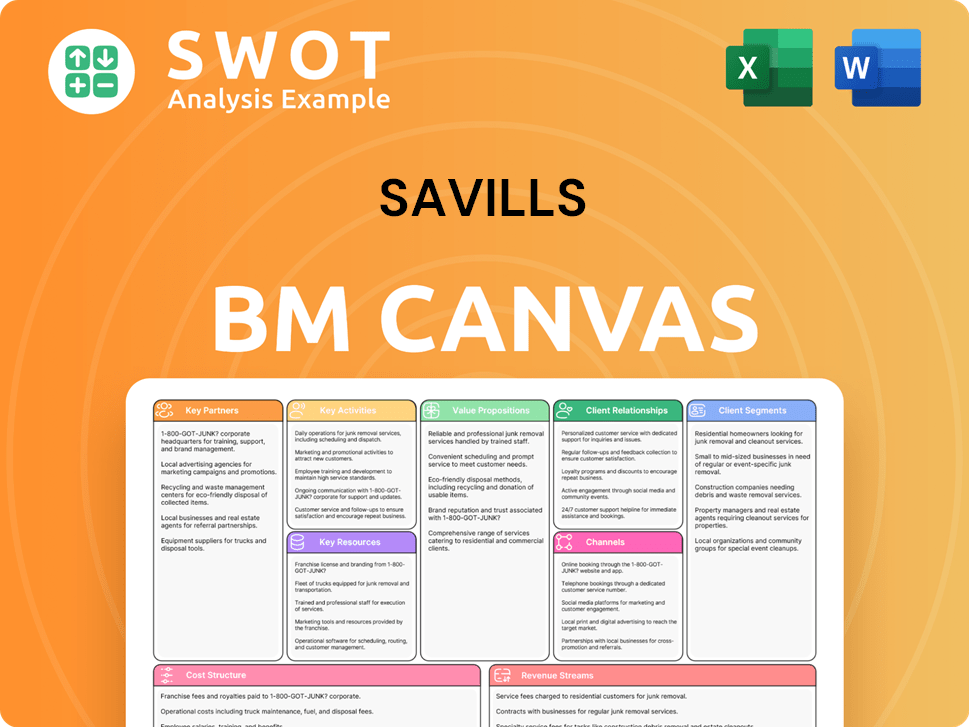
What Risks Could Slow Savills’s Growth?
The path to growth for any global real estate services provider like Savills is fraught with potential risks and obstacles. These challenges range from intense competition within the real estate market to the impact of broader economic and geopolitical factors. Understanding and proactively managing these risks is crucial for achieving the company's strategic objectives and maintaining its competitive edge.
External factors, such as regulatory changes and fluctuating interest rates, can significantly influence the company's performance. Internal challenges, including the need for continuous technological adaptation and the acquisition and retention of skilled professionals, also pose significant hurdles. A robust risk management framework is essential for navigating these complexities and ensuring long-term sustainability for the company.
The company's Savills growth strategy is influenced by various external and internal factors. The real estate market is inherently cyclical, and economic downturns can lead to reduced transaction volumes and property values. Geopolitical instability, such as the ongoing uncertainty in various regions, can also impact market sentiment and investment decisions. Furthermore, competition within the Savills competitive landscape is fierce, with numerous players vying for market share.
The real estate market is highly competitive. New entrants and evolving market dynamics constantly challenge established firms. This requires continuous innovation and adaptation to maintain market share and profitability in the Savills company analysis.
Regulatory changes, such as those affecting the private rented sector, can suppress transactions. Geopolitical instability can also impact market stability. These factors can lead to fluctuations in property values and investor confidence, affecting Savills future prospects.
Higher than expected inflation and fluctuating interest rates can impact mortgage rates and property values. Supply chain vulnerabilities can affect project timelines and costs. These economic factors directly influence the Savills performance.
Rapid advancements in technology, particularly in AI, require continuous adaptation. Poorly executed technology projects can lead to financial losses. The firm must stay at the forefront of technological advancements to remain competitive in the commercial property sector.
Acquiring and retaining talent in a specialized field can be challenging. Internal resource limitations can hinder the company's ability to execute its strategic initiatives effectively. This affects the Savills expansion plans 2024.
The environmental impact of energy-intensive facilities, such as data centers, is a growing concern. The company must address these risks through sustainability initiatives and energy-efficient building designs to ensure Savills sustainable development initiatives.
Savills employs an Enterprise Risk Management (ERM) framework to identify, assess, and manage key business risks. This structured approach aligns with the company's strategic objectives and includes a risk appetite statement. The ERM framework ensures a proactive approach to risk management, which is crucial for Savills global presence.
Diversifying the portfolio across different asset classes and geographical regions helps mitigate risks. Rebalancing towards sectors like living, logistics, and food retail is a strategic move. This diversification strategy helps to stabilize Savills revenue growth drivers.
Continuous investment in technology is essential to stay competitive. Integrating AI and other technological advancements can streamline operations and enhance client services. This helps Savills technology integration in real estate.
Focusing on energy-efficient building designs and sustainability initiatives mitigates environmental risks. Retrofitting existing buildings and promoting green building practices are key strategies. These initiatives contribute to Savills long-term growth outlook.
For example, in 2023, the company's revenue was significantly impacted by economic uncertainties. The company's strategic response included cost management and a focus on high-growth markets. Additionally, the company is actively working on acquisitions and mergers to expand its service offerings and market reach, which is a key element of Savills acquisitions and mergers strategy.
To learn more about the market and the company's strategy, consider reading about the Target Market of Savills.
Savills Porter's Five Forces Analysis
- Covers All 5 Competitive Forces in Detail
- Structured for Consultants, Students, and Founders
- 100% Editable in Microsoft Word & Excel
- Instant Digital Download – Use Immediately
- Compatible with Mac & PC – Fully Unlocked
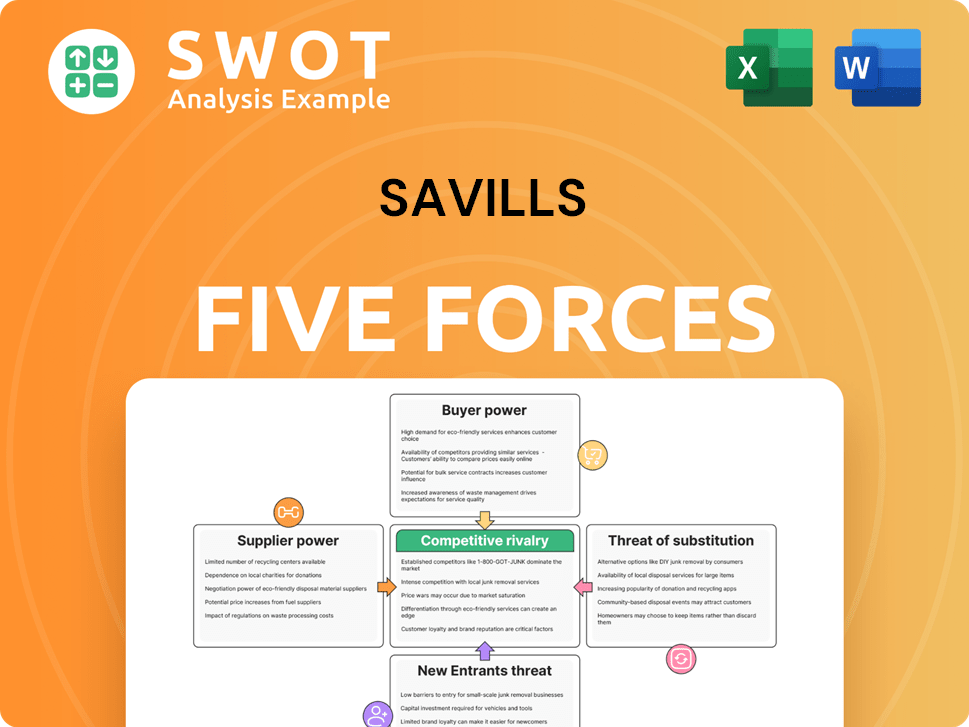
Related Blogs
- What are Mission Vision & Core Values of Savills Company?
- What is Competitive Landscape of Savills Company?
- How Does Savills Company Work?
- What is Sales and Marketing Strategy of Savills Company?
- What is Brief History of Savills Company?
- Who Owns Savills Company?
- What is Customer Demographics and Target Market of Savills Company?
Disclaimer
All information, articles, and product details provided on this website are for general informational and educational purposes only. We do not claim any ownership over, nor do we intend to infringe upon, any trademarks, copyrights, logos, brand names, or other intellectual property mentioned or depicted on this site. Such intellectual property remains the property of its respective owners, and any references here are made solely for identification or informational purposes, without implying any affiliation, endorsement, or partnership.
We make no representations or warranties, express or implied, regarding the accuracy, completeness, or suitability of any content or products presented. Nothing on this website should be construed as legal, tax, investment, financial, medical, or other professional advice. In addition, no part of this site—including articles or product references—constitutes a solicitation, recommendation, endorsement, advertisement, or offer to buy or sell any securities, franchises, or other financial instruments, particularly in jurisdictions where such activity would be unlawful.
All content is of a general nature and may not address the specific circumstances of any individual or entity. It is not a substitute for professional advice or services. Any actions you take based on the information provided here are strictly at your own risk. You accept full responsibility for any decisions or outcomes arising from your use of this website and agree to release us from any liability in connection with your use of, or reliance upon, the content or products found herein.